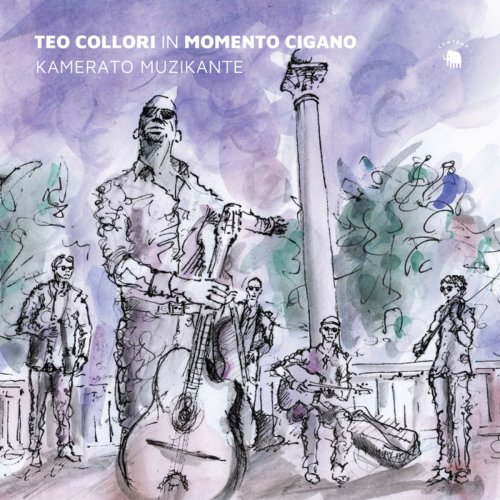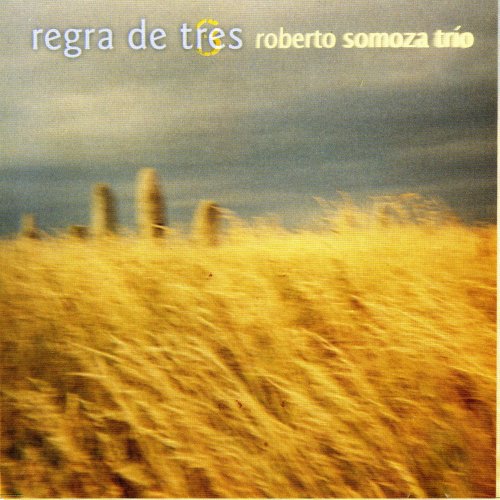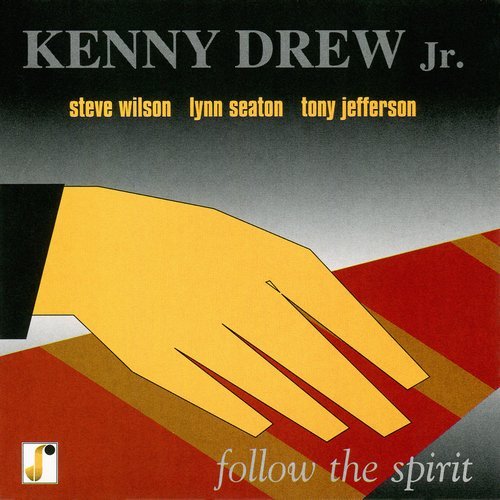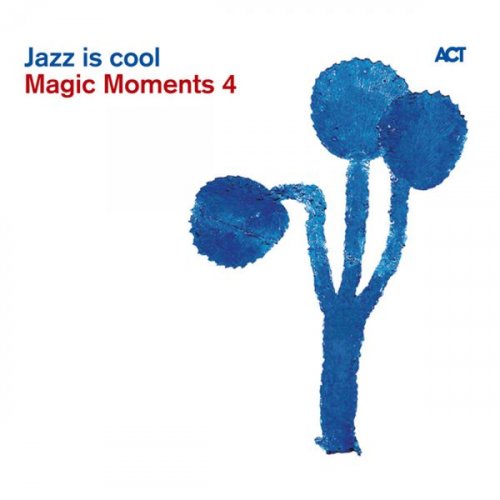Teo Collori - Kamerato Muzikante (In Momento Cigano) (2019)

Artist: Teo Collori
Title: Kamerato Muzikante (In Momento Cigano)
Year Of Release: 2019
Label: Lowtemp
Genre: Jazz
Quality: FLAC (tracks)
Total Time: 50:27 min
Total Size: 231 MB
WebSite: Album Preview
Tracklist:Title: Kamerato Muzikante (In Momento Cigano)
Year Of Release: 2019
Label: Lowtemp
Genre: Jazz
Quality: FLAC (tracks)
Total Time: 50:27 min
Total Size: 231 MB
WebSite: Album Preview
01. Mimi
02. Istriano Duo
03. Srečo
04. La Pluie
05. Die Hitze Der Sommernacht
06. Negotova
07. Senza Risposta
08. Bled 1960
09. Azil
10. Tango
11. Warrior's Lullaby
In the three years that passed between the Hot Club Piran and his successor Kamerata muzikante (2018, self-publishing), some of the essential things changed in Teo Collori and Momento Cigano. The whole rhythm section was changed - on the contrabass is Jan Gregorka, on the rhythm of the guitar Metod Banko - and the authorship of music has been redistributed from Tea Colloria among other members, making the album a more bandsaw sound. In this way, the musicians have made a qualitative leap in the definition of their sound and arrangements, and at the same time they experience an upswing in their career, which is an occupation that carries out instrumental music, is unusual and interesting, and testifies to the excellence of performance and composition (despite the fact that these two - quality and popularity - are often not proportionate).
Eleven new compositions can be found on a bad hour. Introductory Mimi with its medium pace and simpler arrangement continues the red thread from the previous album, and the next, the waltz Istriano duro, presents a different sound and rhythmic patterns. Up-tempo representation is introduced by Srečo, with one more vocal refren, which is also emphasized by vocal spots. Violinist Matija Krečič with a solo, structured from the sixteen, gives the impression that the band has paid more attention than it has so far devoted to the construction of solos, which generally sound more thoughtful, although improvised.
The sophisticated arrangement is also one of the pillars of the La pluie ballade, which begins with a wonderful interplay of guitars and violins, and then they join other instruments that gradually orchestrate the sound image into a rich and imaginatively arranged whole, where nothing is superfluous.
According to the optional Die Hitze der Sommernacht, which returns the mood somewhere to the beginning, it is painless with the title Negotova to point out the aforementioned rhythm section, which, both in this composition and throughout the album, performs well the responsible and demanding work of the rhythmic foundation of virtuoso soloists. At the Senza risposta, the dominant gypsy rhythm is initially replaced by the unisono riff of bass and guitars, and on the clarinet, between the soloist Matej Kužel, an interesting two-piece pizzicato accompanied by Krečič and (probably) Collorio.
Bled 1960, another hit (whatever that means in instrumental music), does not leave any doubt with the name, not with the tactile way, nor with the sound, that it is powered from the golden time of the Slovenian pop. Asylum greatly changes moods, and after the mysterious rhythmic-harmonic basis, the Puppy again blazes with the salt.
The Band also keeps the listeners' concentration by giving each song a single solo, with the exception of the Marathon Tango, where Collori, Kužel and Krečič exchange as soloists, the latter also with an imaginative percussive introduction to their solo exposures. Gregorka persistently maintains the pulse for all ten minutes, while the band follows and supports each soloist dynamically.
Warrior's Lullaby with a pedal "Drone" accompanying the clarinet and violin guitars in octaves represents an contemplative ending of an excellent album. The end would be even more excellent with a less aggressive conclusion on "Method's Throat Singing" (Collorie's sms-intervention is quoted, for initially we marked it as didgeridoo), which unnecessarily wakes up the listener from the hypnosis created by the album as a whole, yet especially the last composition.
Momento Gigano created a more complex material this time, but not so structurally (tracks mostly follow the theme of the theme-solo theme), but the complexity is reflected in details and arrangements, thus allowing music to maintain focus. The predecessor of the Hot Club Piran was a great product, but the Kamerata musicians surpassed it in every way.
Eleven new compositions can be found on a bad hour. Introductory Mimi with its medium pace and simpler arrangement continues the red thread from the previous album, and the next, the waltz Istriano duro, presents a different sound and rhythmic patterns. Up-tempo representation is introduced by Srečo, with one more vocal refren, which is also emphasized by vocal spots. Violinist Matija Krečič with a solo, structured from the sixteen, gives the impression that the band has paid more attention than it has so far devoted to the construction of solos, which generally sound more thoughtful, although improvised.
The sophisticated arrangement is also one of the pillars of the La pluie ballade, which begins with a wonderful interplay of guitars and violins, and then they join other instruments that gradually orchestrate the sound image into a rich and imaginatively arranged whole, where nothing is superfluous.
According to the optional Die Hitze der Sommernacht, which returns the mood somewhere to the beginning, it is painless with the title Negotova to point out the aforementioned rhythm section, which, both in this composition and throughout the album, performs well the responsible and demanding work of the rhythmic foundation of virtuoso soloists. At the Senza risposta, the dominant gypsy rhythm is initially replaced by the unisono riff of bass and guitars, and on the clarinet, between the soloist Matej Kužel, an interesting two-piece pizzicato accompanied by Krečič and (probably) Collorio.
Bled 1960, another hit (whatever that means in instrumental music), does not leave any doubt with the name, not with the tactile way, nor with the sound, that it is powered from the golden time of the Slovenian pop. Asylum greatly changes moods, and after the mysterious rhythmic-harmonic basis, the Puppy again blazes with the salt.
The Band also keeps the listeners' concentration by giving each song a single solo, with the exception of the Marathon Tango, where Collori, Kužel and Krečič exchange as soloists, the latter also with an imaginative percussive introduction to their solo exposures. Gregorka persistently maintains the pulse for all ten minutes, while the band follows and supports each soloist dynamically.
Warrior's Lullaby with a pedal "Drone" accompanying the clarinet and violin guitars in octaves represents an contemplative ending of an excellent album. The end would be even more excellent with a less aggressive conclusion on "Method's Throat Singing" (Collorie's sms-intervention is quoted, for initially we marked it as didgeridoo), which unnecessarily wakes up the listener from the hypnosis created by the album as a whole, yet especially the last composition.
Momento Gigano created a more complex material this time, but not so structurally (tracks mostly follow the theme of the theme-solo theme), but the complexity is reflected in details and arrangements, thus allowing music to maintain focus. The predecessor of the Hot Club Piran was a great product, but the Kamerata musicians surpassed it in every way.

![Noga - Heroes in The Seaweed (2025) [Hi-Res] Noga - Heroes in The Seaweed (2025) [Hi-Res]](https://www.dibpic.com/uploads/posts/2026-02/1771663366_nhs500.jpg)


![William Ackerman - Past Light (1983) [1997 Japanese Edition] William Ackerman - Past Light (1983) [1997 Japanese Edition]](https://www.dibpic.com/uploads/posts/2026-02/1771702726_001.jpg)
![Greg Foat & Sokratis Votskos with The Giorgos Pappas Trio - Impressions of Samos (2026) [Hi-Res] Greg Foat & Sokratis Votskos with The Giorgos Pappas Trio - Impressions of Samos (2026) [Hi-Res]](https://www.dibpic.com/uploads/posts/2026-02/1771506483_sa4kxxin052ht_600.jpg)


![Magda Mayas' Filamental - Murmur (2026) [Hi-Res] Magda Mayas' Filamental - Murmur (2026) [Hi-Res]](https://www.dibpic.com/uploads/posts/2026-02/1771663724_i3cjtptz4ae2l_600.jpg)